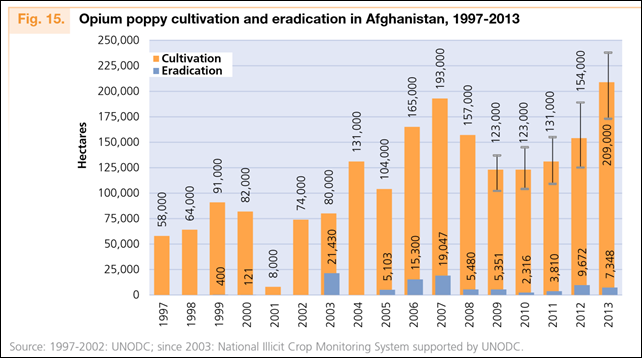What year did we arrive to free Afghans from the clutches of the Taliban?
This is called winning hearts and minds?
It seems we are having as much success with the War on Terror as we are with the War on Drugs.
It almost appears like we don’t really want to win these wars. I wonder why?

Washington, 21 October 2014 (Reuters) – Opium poppy cultivation in Afghanistan has hit an all-time high despite years of counter-narcotics efforts that have cost the US $7.6bn (£4.7bn), according to a US government watchdog.
The UN Office on Drugs and Crime [pdf] reported that Afghan farmers grew an “unprecedented” 209,000 hectares (523,000 acres) of opium poppy in 2013, surpassing the previous high of 193,000 hectares in 2007, said John Sopko, the special inspector general for Afghanistan reconstruction.
“In past years, surges in opium poppy cultivation have been met by a coordinated response from the US government and coalition partners, which has led to a temporary decline in levels of opium production,” Sopko said in a letter to the secretary of state, John Kerry, the defence secretary, Chuck Hagel, and other top US officials.
“The recent record-high level of poppy cultivation calls into question the long-term effectiveness and sustainability of those prior efforts,” he said on Tuesday.
Afghanistan produces more than 80% of the world’s illicit opium, and profits from the illegal trade help fund the Taliban insurgency. US government officials blame poppy production for fuelling corruption and instability, undermining good government and subverting the legal economy.
The US has spent $7.6bn on counter-narcotics efforts in Afghanistan since the start of the 2001 war, it said.
Sopko said the UN drug office estimated the value of poppy cultivation and opium products produced in Afghanistan in 2013 at about $3bn, up on the $2bn estimated in 2012.
“With deteriorating security in many parts of Afghanistan and low levels of eradication of poppy fields, further increases in cultivation are likely in 2014,” Sopko said.
He said affordable deep-well technology brought to Afghanistan over the past decade had enabled Afghans to turn 200,000 hectares of desert in the south-west of the country into arable land, much of it devoted to poppy production.
In a letter responding to the findings, the US embassy in Kabul said the rise in poppy cultivation and decline in eradication efforts by provincial authorities was “disappointing news”. It said American officials were helping Afghans develop the ability to lead and manage a long-term counter-narcotics effort.





